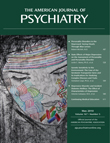Depressive Disorder and Incident Diabetes Mellitus: The Effect of Characteristics of Depression
Abstract
Objective
The purpose of this study was to test the hypothesis that clinically significant depression detected in a population sample increases the risk of diabetes mellitus. The authors examined the effect of characteristics of depression frequently found in the community on the risk of incident diabetes mellitus.
Method
A large community sample of adults aged ≥55 years (N=4,803) was assessed at baseline in a longitudinal three-wave epidemiological enquiry using a psychiatric interview and the Geriatric Mental State Schedule. Cases of depression were diagnosed according to standardized criteria, and diabetes was assessed using a risk factors questionnaire. Follow-up evaluations, conducted 2.5 and 5 years later, were completed to determine the incidence of diabetes.
Results
At baseline, 379 case subjects with depression were identified. The risk of incident diabetes mellitus was higher among subjects with depression when compared with nondepressed subjects, and the association remained significant after controlling for potential confounders, including diabetes risk factors. The estimated rate of diabetes mellitus attributable to depression was 6.87%. An increased risk of diabetes mellitus was also associated with the following characteristics of depression: nonsevere depression, persistent depression, and untreated depression. Treatment with antidepressants was not associated with an increased risk of diabetes mellitus.
Conclusions
Clinically significant depression is associated with a 65% increased risk of diabetes mellitus. Characteristics of depression frequently found in the community, namely nonsevere depression, persistent depression, and untreated depression, may play a role in the development of diabetes in a predominantly elderly adult population.



